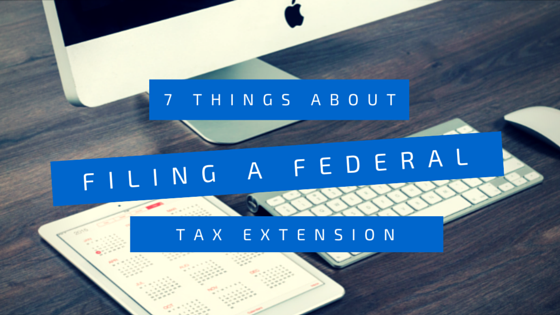If you don't have your taxes completed by the April 15th deadline, the IRS has a provision to file an extension using Form 4868. This gives you an automatic six-month extension to complete your return.
People will usually file a Federal Tax Extension for one of two reasons:
- They haven’t collected all their paperwork and data to file.
- They think they will owe money and don't have the funds to pay it.
Neither of these reasons are good.
Here's what you need to know before filing a federal tax extension:
#1: Filing an extension does not mean you don't have to pay your taxes by the deadline.
You should be able to quickly compute a rough estimate of what you are going to owe. The IRS requires you to send this amount in by the April 15th deadline. Filing an extension does not mean that you can extend your payment. You can only extend filing the forms and completing the paperwork.
#2: Underestimating what you owe will result in stiff penalties and increase your tax burden.
If you underestimate the amount of taxes you owe, it will only result in you owing more. The IRS charges penalties and interest on the money that is owed, so delaying the inevitable only puts you further behind.
It is better to pay an overestimate of the amount owed. Any overpayment will be refunded, but you will pay dearly for underestimating your taxes.
#3: Filing an extension does not affect filing quarterly estimates.
Filing quarterly estimates are required for the current tax year, even when you have an extension pending from last year. Failing to file your quarterly estimates on time will result in still more penalties and interest.
#4: The automatic extension granted expires on October 15th.
If you have a legitimate reason for requesting an extension, don't breathe a sigh of relief and wait until October. Get your return completed as soon as possible. Don't use an extension as an excuse to procrastinate. If taxes still aren't filed when the extension expires, it can't be extended again.
#5: Even if you are able to avoid penalties for filing late or paying too little, any money due you from the IRS accrues interest for them, not you.
Why would you want your money to make interest for the IRS? It is better to file your return and get any amount due you back in your control and working for you. Don't let your money sit in the IRS' bank, get it back in yours where it will benefit you.
#6: Filing an extension does not make you more susceptible to an audit.
An extension on filing your annual tax return is not an “audit trigger.” The only correlation between extensions and audits is that people who procrastinate and are sloppy with their recordkeeping often make other errors that may prompt an audit in their future. The fact of an extension alone will not increase the scrutiny of your return.
#7: It is fine to request an extension for legitimate reasons. However, procrastination is not one of them.
The provision for an extension is sometimes necessary. If it is, don't be afraid to use it. The IRS makes this provision because they realize you may have a valid purpose for not getting your taxes completed by April 15th. What are some of the legitimate reasons to apply for an extension? You may need to file for an extension if:
- You are the victim of a prolonged illness.
- You are currently serving in an active combat zone.
- You are out of the country and don't have access to your financial information.
- …or any number of extenuating personal situations.
The Bottom Line
Remember, you may use the IRS' provision to file an extension if you need to do that for a valid reason, however, the IRS will make you pay for abusing that option.

